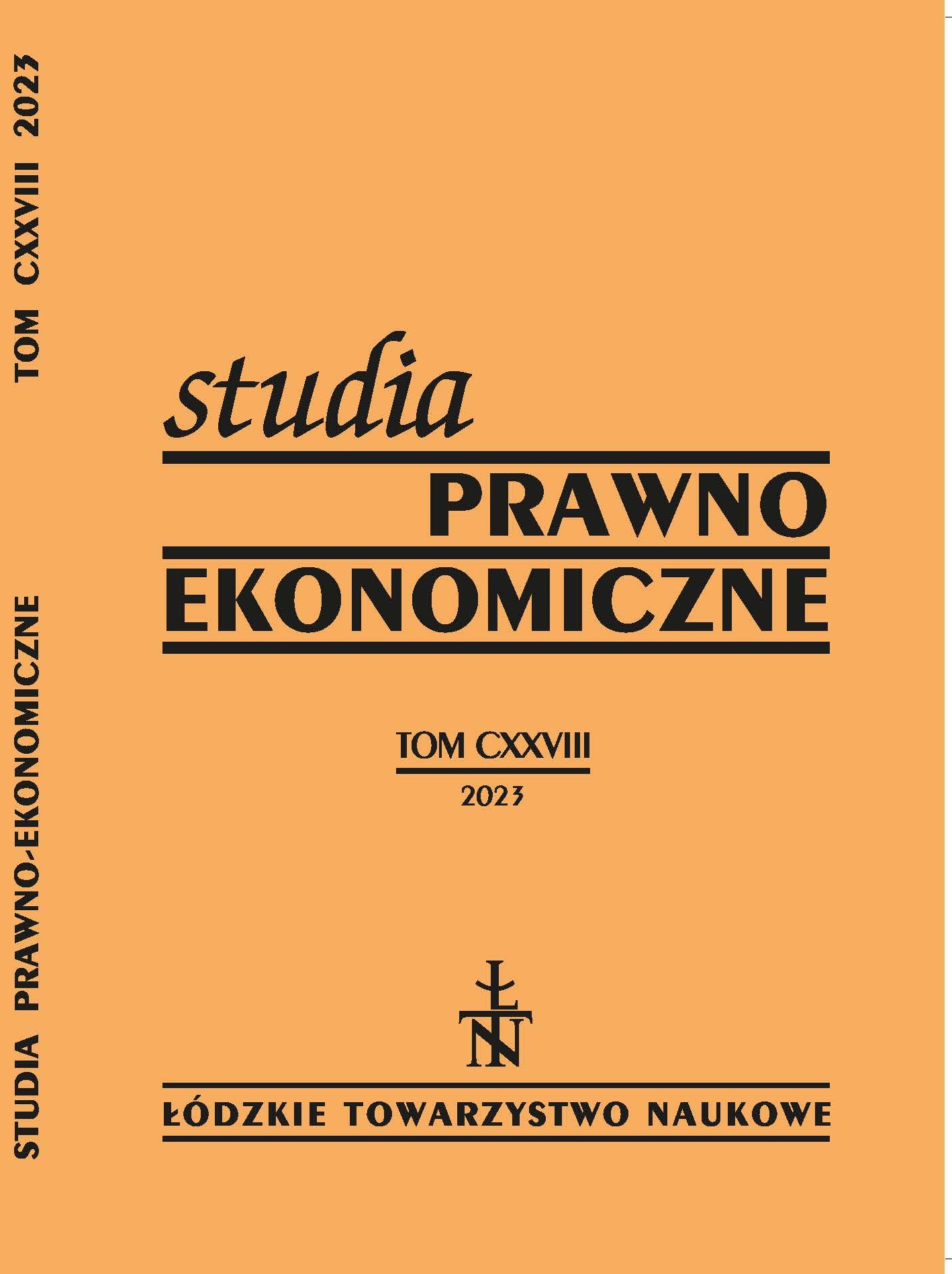The state as a source of destabilisation of the banking sector in the view of the modern free banking school
DOI:
https://doi.org/10.26485/SPE/2023/128/8Keywords:
bank runs, bank panics, banking crisisAbstract
Background: The subject of this study is the destabilising effect of state intervention on the banking sector as defined by the so-called Modern Free Banking School (MFBS).
Research purpose: The purpose of the research, is to provide an insight into how, within the framework of the MFBS, the state (through various interventions) leads to the destabilisation of the banking sector.
Methods: The research method used in this article is literature review.
Conclusions: Six key conclusions can be drawn from the following article. First, the MFBS presents a logically coherent explanation of how “free banking” (i.e. without state influence) would be stable, and how successive state interventions – by restricting banks’ freedom – destabilise the banking sector. Second, the main mechanisms by which, according to the MFBS, marketbased monitoring and market -based disciplining of banks would take place are confirmed by the results of (cited) empirical studies. Third, the cited studies comparing a de facto (rather than de jure) “free banking” sector with a banking sector that was under strong state influence, suggest that “free banking” was: (i) more stable and (ii) more efficient. Fourth, the introduction of “free banking” nowadays seems unrealistic, as it worked when two conditions were met: (i) banks were free to print private banknotes and (ii) owners were liable for bank debts in excess of the investment, that they (owners of the bank) made in a (given) bank. Fifth, some of the detailed comments made by the MFBS representatives are no longer relevant, due to the impact of new technologies in banking. Sixth, the fact that a return to “free banking” is unrealistic does not mean that the general remarks of the MFBS representatives, do not have potential application in the process of shaping state policy on the banking sector, of which those concerning the strengthening of market mechanisms for banking development, including market competition, seem particularly relevant.
Downloads
References
Awrey D., Unbundling Banking, Money, and Payments, European Corporate Governance Institute, Law Working Paper No. 565/2021, Cornell Legal Studies Research Paper No. 21–11, Georgetown Law Journal, 2021.
Bender M., Panz S., A general framework for the identification and categorization of risks: An application to the context of financial markets, Journal of Risk 2021/23 (4), s. 21–49.
Calomiris C., Is Deposit Insurance Necessary? A Historical Perspective, Journal of Economic History 1990/50, s. 283–295.
Calomiris C., Gorton G., The Origins of Banking Panics: Models, Facts, and Bank Regulation, w: R.G. Hubbard (red.), Financial Markets and Financial Crises, University of Chicago Press and NBER, Chicago 1991.
Calomiris C., Haber S., Fragile by Design: The Political Origins of Banking Crises and Scarce Credit, Princeton University Press, 2014.
Gorton G., Banking Panics and Business Cycles, Oxford Economic Papers 1988/40 (4).
Gorton G., Banking panics and business cycles: Data sources, data construction, and further results, Working Papers 86–10, Federal Reserve Bank of Philadelphia, 1986.
Gorton G., Misunderstanding Financial Crises: Why We Don’t See Them Coming, Oxford University Press, 2012.
Gorton G., Questions and Answers about the Financial Crisis, NBER Working Papers 15787, National Bureau of Economic Research, Inc., 2010.
Gorton G., Slapped by the Invisible Hand: The Panic of 2007 (Financial Management Association Survey and Synthesis), Oxford University Press, 2010.
Gorton G., Metrick M., Getting up to Speed on the Financial Crisis: A One-Weekend-Reader’s Guide, NBER Working Papers 17778, National Bureau of Economic Research, Inc., 2012.
Gorton G., Mullineaux D., The Joint Production of Confidence: Endogenous Regulation and Nineteenth Century Commercial-Bank Clearinghouses, Journal of Money, Credit and Banking, Nov., 1987/19/4, s. 457–468, 1987.
Gorton G., Zhang J., Taming Wildcat Stablecoins (September 30), 2021.
Jaremski M., Bank-Specific Default Risk in the Pricing of Bank Note Discounts, The Journal of Economic History 2011/71 (4).
Kane E., Wilson B., The Demise of Double Liability as an Optimal Contract for Large-Bank Stockholders, NBER, Working Paper 1996/5848.
Kaufman G., Bank Runs: Causes, Benefits, and Costs, Cato Journal 1988/7 (3).
Kroszner R., Lessons from Financial Crises: The Role of Clearinghouses, Journal of Financial Services Research 2000/18, s. 157–171.
Lakomaa R., Free Banking in Sweden 1830–1903: Experience and Debate, The Quaterly Journal of Austrian Economics 2007/10 (2), s. 122–141.
Macey J., Miller G., Double Liability of Bank Shareholders: History and Implications, Wake Forest Law Review, 1992/27, s. 31–62.
Mitchener K., Richardson G., Does “Skin in the Game” Reduce Risk Taking? Leverage, Liability and the Long-Run Consequences of New Deal Banking Reforms, NBER Working Papers 2013/18895.
Selgin G., Free Banking, The Review of Austrian Economics 2014/9 (1).
Selgin G., The institutional roots of Great Britain’s big problem of small change, European Review of Economic History 2010/14 (2).
Selgin G., Money: Free and Unfree, Cato Institute, 2017.
Selgin G., White L., The Evolution of a Free Banking System, Working Papers 85–38, C.V. Starr Center for Applied Economics, New York University, 1985.
Selgin G., White L., The Theory of Free Banking: Money Supply under Competitive Note Issue,
Rowman & Littlefield, Lanham, MD, 1998.
White L., The Evolution of a Free Banking System, Working Papers, C.V. Starr Center for Applied Economics, New York University, 1987.
White L. Free Banking, the International Library of Macroeconomic and Financial History series, Edward Elgar Publishing, 1993.
White L., Free Banking in History and Theory, GMU Working Paper in Economics 2014/14–07.
White L., Salter A., Veetil V., Extended shareholder liability as a means to constrain moral hazard in insured banks, The Quarterly Review of Economics and Finance 2017/63/C, s. 153–160.
The explosion in stablecoins revives a debate around “free banking”, https://www.economist.com/finance-and-economics/2021/12/04/the-explosion-in-stablecoins-revives-a-debatearound-free-banking; stan na 22.05.2023 r.
Downloads
Published
How to Cite
Issue
Section
License
Copyright (c) 2023 Łódzkie Towarzystwo Naukowe

This work is licensed under a Creative Commons Attribution-NonCommercial-NoDerivatives 4.0 International License.



